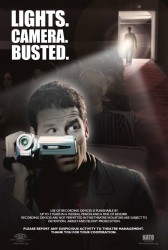So a big week in which we have the aftermath of the PS4 launch, and the Xbox One launch later during the week. I don’t know if I will ever understand the desire to line-up for launch day releases. Sounds like a lot of time and effort that could be better used. Like wasting hours trying to decide what to watch on Netflix (see last week’s WNR).
Here comes the news.
![]()
Paranoid much? Reading the MPAA’s updated guidelines for theater owners, in regards to preventing cam-recordings, you really do get a glimpse of the paranoid world in which the MPAA operates (and the paranoia extends beyond just piracy – if you have time, check out the documentary This Film Is Not Yet Rated, which I believe is on Netflix at the moment). People with walking canes; people with long coats; people who put their phones in the cup holder; people that go to cinemas; people what work at cinemas; and their friends, are all potential movie pirates. All suspicious activity, even if it’s just someone sitting in a weird way, should be looked and reported to law enforcement for further action.
And that’s just for regular screenings. For pre-screenings, the MPAA recommends mandatory bag searches, the use of night vision equipment and procedures that even airport security might find a tad harsh. I’m sure in a lab somewhere, the MPAA is researching the viability of camera sniffing dogs and the use of full body scanners, to be recommended for next year’s guideline update.
What strikes me most about the guidelines is how the MPAA is completely willing to ignore the fact that someone who is completely satisfied by an awful, partially blocked, muffled recording of say a hit film like Gravity will probably never ever spend a single cent on the film, at the theater or otherwise. The biggest loss of revenue, and certainly not in the billions or whatever the MPAA claims, might be from those who are unconvinced by the film and are using the CAM copy to decide whether it’s worth spending their hard-earned. Good films will suffer less from this kind of “trial”, and the box office records that are being broken year on year seems to support this notion. Only the bad films will suffer. It just happens to be that bad films are the MPAA’s bread and butter, unfortunately.
And publishing paranoid anti-piracy guidelines is certainly a lot easier than trying to create better movies, and so that’s what the MPAA will do.
Also easy to do, for the MPAA (and RIAA) is to use the threat of copyright fines to inject an element of fear into the piracy debate. Easy, but but perhaps not so effective. We’ve all seen those FBI and Homeland Security notices at the beginning of DVD and Blu-rays, but piracy is still happening with no signs of slowing down. Other than the two high profile RIAA cases which saw high statutory damages making headlines, statutory damages hasn’t really done much to deter pirates. Instead, it has encouraged predatory lawsuits targeting unsuspecting individuals, threatening them with high copyright fines (based on statutory damages), all to extract thousands of dollars in “pre-trial settlement” fees for lawsuit that were never going to court.
Which is why the U.S. Department of Commerce’s Internet Policy Task Force urged for a “recalibration” of copyright statutory damages in a Green Paper published earlier in the year, which also asked for comments on any proposed changes. The MPAA and RIAA’s responses have just been made public, and as expected, both groups were against any changes to the status quo.
The MPAA argues that statutory damages is working perfectly fine to deter pirates, which doesn’t explain why the MPAA have continued to argue for tougher copyright laws, citing existing laws as being not enough of a deterrent. The RIAA goes as far as to defend the obscene judgments made in the Thomas-Rasset and Tenenbaum cases (of $1.92 million for 24 songs, and $675,000 for 30 songs, initially), saying both were “entirely appropriate, based on the facts of each case.”
I think high statutory damages is actually counterproductive to even the misguided aims of the MPAA/RIAA. For example, had Thomas-Rasset being fined just $19,200, it would have had the same effect deterrent wise (because $19,200, for 24 songs, is still quite a lot of money especially for the teenagers and college students that are the main demographics behind downloads), and it would not have attracted the same level of outrage and disgust that forced the RIAA to abandon their “sue the individual” tactics.
But a smaller statutory damages maximum would then wreck havoc to the MPAA/RIAA’s “annual losses to piracy” calculations, making it much harder to claim that billions of dollars are being lost. For them though, this may be more important, since it’s these heady figures that scare politicians, and judges and juries, into believing that major wrongs have been committed and drastic action is needed, whether it’s SOPA or six figure judgments against college students.
![]()
Amazing sales numbers for the PS4, and the most surprising part was that it wasn’t unexpected at all! Over a million units sold in the first 24 hours in North America, thanks to super strong pre-order numbers, means that the PS4 is the most popular console launch in history, probably. Plaudits must go to Sony for recognising everything that went wrong with the PS3 launch, and doing it (mostly) right this time round. This includes pricing mainly, but also being on the right side of consumer rights, for once.
With such a huge launch, there was always a chance that something would go wrong. And something did, in relation to the “Blue light of death” problem that gamers have so creatively (sarcasm alert) named. A troubleshooting guide has been made available, but worst case scenario, you’ll have to exchange the console for a new one. Sony says only a small number of consoles is affected, perhaps less than 0.4%.
Over at Redmond, Microsoft’s Xbox One launch experience was actually incredibly similar. Again, over a million units were reported to be sold in the first 24 hours, with the caveat that the Xbox One was released in more markets than the PS4 (which was only available in North America). Being more expensive, and with a semi-botched pre-launch, the Xbox One was never going to sell as many units as the PS4, but a million on the first day is impressive (the Xbox 360 managed just over 300,000, in North America, in the first week).
And just like the PS4 launch, there are reports of hardware issues, the most common being the disc drive grinding issue. Microsoft has promised to do advanced returns, which means Microsoft will send out a replacement console immediately without waiting for the defective console to arrive, which means affected gamers will only have to wait a matter of days as opposed to weeks to have a working console.
All to be expected for a launch of these magnitudes, which is one more reason why you shouldn’t join the launch day madness if you’re like me and don’t like the hassle.
Speaking of hassles, let me stop hassling you with news, rants and stuff for this week, for we have reached the end of another issue of the WNR. See you next week.




